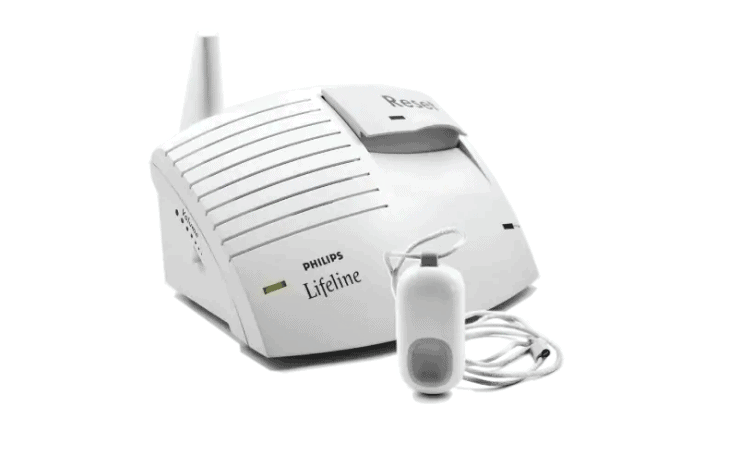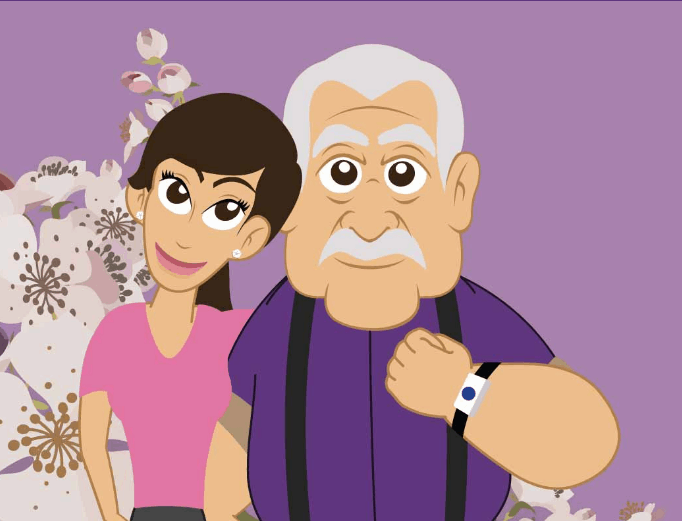Table of Contents
How to Find the Best Medical Alert System
No matter how prepared you are, growing older increases the risk that you’ll have to deal with a personal medical emergency sooner or later. But that doesn’t mean you have to worry about it. Medical alert systems are a great way to keep your peace of mind close at hand, and they have come a long way since that lady fell and couldn’t get up. Today’s models use the latest technology and research on senior-friendly user experiences to bring you medical alert systems that fit your specific lifestyle, whether you’re hiking the Appalachian Trail, babysitting your grandkids, or enjoying your retirement in an assisted living facility (or all three!). We’ve got tips on how to find your perfect device, and we’ll recommend a few of our favorites for you as well. Enjoy!
What is a medical alert system?
At their core, medical alert systems are exactly what they sound like – a way to contact medical personnel in case of an emergency. They are designed so that all you have to do is press a button to get in touch with a professional who can help. This button is made to be wearable, in the form of a necklace, wristwatch-type strap, or other design that is easy to keep tethered to yourself at all times so it will always be within reach. When you press the button, the system in your home is activated and knows to call 911 to immediately connect you to your local medical authorities.

Why do I need a medical alert system?
You may think that your smartphone, home assistant, or other communication devices are plenty for you. Unfortunately, that’s not always the case, and medical emergencies are not the time you want to find out exactly how those technologies fall short.
Smartphones and cell phones.
There are two major flaws in mobile phones that make them unreliable for medical emergency alert purposes. The first is that they’re too easy to leave behind. Medical alert devices are designed to be worn so that your hands remain free and you don’t have to worry about setting them down and not remembering to pick them back up. Mobile phones are not designed for that capability and are often dependent on other non-permanent features to stay close, such as pockets. But medical alert devices can be worn unobtrusively and independent of anything else, which gives them a definite advantage over mobile phones. Also, mobile phones have to share their design with a host of other features besides emergency calls. Designers strive to make them intuitive to use, but this might not be enough when you’re experiencing a medical emergency. Medical alert devices require you to push a button and that’s it.
Alexa and Siri.
As integrated as voice command has become into our daily routines, the technology is just not good enough to rely on for emergencies. Neither Google nor Apple’s device can connect you with 911, which is a serious flaw for anyone looking for a medical alert system. And what if you’ve gotten into a situation where you can’t talk? That’s very common for sudden medical incidents, such as when you fall and get the wind knocked out of you, or if there’s a fire and you can’t breathe properly. We’re not here to scare you, but we do want to make you aware of your current devices’ limitations. Medical alert systems are much more specified to handle emergencies.

What do I need to think about when looking for a medical alert system?
Medical alert systems are designed to be easy to understand and use, but they come in a lot of varieties that can be overwhelming when you start your search. We’re here to help you sort through the types of medical alert systems available and which ones work best for different kinds of living situations.
Home-based.
The original medical alert systems were created when cell phones were decades away from becoming ubiquitous, and many companies still give you the option to use a system that is based on your residential landline. If you choose this, you will be able to talk to emergency professionals through your home phone, including using your cell phone within your own premises, but you won’t be able to use your medical alert button once you leave your house. These are good medical alert systems are good for seniors who are homebound or bedridden. Seniors in those positions are also typically experiencing mobility issues because of chronic medical conditions that make them more vulnerable to emergencies as well; being able to rely on static landline systems instead of a cellular network means these types of medical alert systems don’t have to worry about dropping calls in poor coverage areas. Home-based medical alert systems are also great supplements to those that are built into retirement communities. If you’re in a community that gives you a lots of freedom of movement, a medical alert system may be a good idea if you’re worried about not being able to get to an in-house assistant.
Mobile-based.
As cell phones became more reliable and common, medical alert systems took notice. You can now choose from any number of medical alert systems that activate your mobile phone so you can talk to emergency personnel wherever you go. Many of these mobile-based systems have additional features that tap into your phone’s GPS to alert emergency professionals to your exact whereabouts, so they’re a great way to feel secure while you’re on the go. Leading an active life is a great way to stay healthy and feeling good, and you don’t have to sacrifice your feeling of safety to do so. There are a couple of things to keep in mind before you go mountain climbing without telling anyone else, though – first, these types of medical alert systems work better if you keep your cell phone near so you can communicate your specifics with emergency contact people. If you’re in dire straights, they can find you via satellite location as we mention above, but that does depend on signal strength. So remember that mobile-based medical alert systems give up a tiny bit of reliability in exchange for a much wider area for you to roam.
Monitored.
If you opt for a monitored medical alert system, that means the button you push will instantly connect you to emergency personnel working for the alarm company 24/7. Companies that offer this feature staff themselves around the clock so you don’t have to worry about no one answering your call, and you talk to a safety expert as your first step. These types of medical alert systems are good for those who are aware of their surroundings and are comfortable talking to strangers about their conditions. This may sound like a trivial detail, but if you are looking to get a medical alert system for a relative that has dementia, or can’t articulate themselves as well as emergency personnel needs, you might want to look elsewhere. Exact locations can be determined by outside technology like GPS, but every detail you can give first responders about an accident makes them more effective, so make sure you or the person who will use this medical alert system is comfortable with that. These also tend to be a little bit more expensive than non-monitored systems because they add a subscription fee to keep you connected to their response time.

Non-monitored.
These types of medical alert systems don’t call medical personnel first. They are programmed to contact personally chosen numbers preset into a list with an order of the user’s choosing. Typically these emergency contacts are relatives, friends, or neighbors – folks who either live close by or understand the user’s situation. Non-monitored medical alert systems are also programmed to ring emergency personnel if nobody else on a user’s list answers. For some users, this contact hierarchy can prevent unnecessarily intrusive interventions and high medical bills for false alarms. If you’re worried about being alone in your house but want to talk to someone you know when you have an accident, non-monitored systems may be for you. They can be helpful for seniors who are becoming uncertain of their surroundings as well – automatically calling a friend or relative who is involved in the user’s long-term medical care will allow them to gather information on the user’s mental state as well as details about their accident that the user themselves may not be able to hold onto long enough to let medical personnel know. With non-monitored systems, friends, relatives, or neighbors can get as many details from the user as possible, combine it with their own knowledge of the user’s general situation, and convey both to medical personnel for an overall more informed rescue. Plus, these types of medical alert systems don’t come with an extra subscription fee, which may be the difference between being able to afford an alert system at all.
Fall detection.
An unfortunate fact of life is that the world gets less steady as you age, and falling as a senior citizen can turn a simple imbalance into a major catastrophe. That’s why some medical alert systems offer fall detection as part of their package. If you choose fall detection, your device will automatically trigger itself without you having to press it when it senses you’ve taken a tumble. It’s a great idea, and if you or your loved one has limited mobility that means you need to use an assistive device such as a cane or walker, it may very well be worth adding onto your medical alert system. However, we do want to caution you that technology is not perfect. It errs on the side of oversensitive, so if you drop your medical alert button, for instance, it will count that as a fall and go off. Some go on alert as you are still wobbling, so if you manage to right yourself it will also send a false alarm. And this is considered an add-on for most systems. But they’re generally not more than an extra $15 a month, which along with a few false alarms may be a small price to pay for another layer of vigilance.
Price.
Medical alert systems are getting more affordable all the time, especially as mobile technology becomes cheaper and easier to use. But they still encompass a wide variety of prices, and any additional services will add to that base price, so when you’re searching for your perfect system, make sure you check on the price of everything you want and whether or not those are recurring subscriptions. Ignoring that will eat into your budget.
Type of hardware.
You don’t have time to mess with emergency technology that isn’t easy to use, and medical alert system manufacturers respect that. They do, however, have very different ideas from each other about what constitutes the perfect user experience. We’ve mentioned the possibilities of wearables, which are your best option for emergency buttons but check out photos and reviews of ones you’re thinking about to make sure the interface is going to work for your situation. Remember, this is the part that you’ll most directly depend on in emergencies, so make sure you can keep it close in a way that’s intuitive and unobtrusive.
Trial period.

Medical alert systems are not something you can try in the store with any sense of how they work in the real world. Carefully reading user reviews can help, but that doesn’t give you a true idea, either. That’s where free trial periods come in. If you find a system that lets you use the product as if you’ve bought it before you actually do, take that offer to see how the system fits into your situation. Your safety means too much to leave to chance, and this is a great way to make sure that doesn’t happen.
Waterproofing.
The bathroom and the kitchen are two of the most common and worst places for accidents in the home, and a large part of that is because of how much water we use in those areas. Anywhere you find it, water makes it more dangerous to move around and operate electronics that help in an emergency, so make sure you find a security alert system that’s not bothered by it.
Battery life.
The makers of medical alert systems realize how important a robust charge is, which is why a lot of their devices can go a week or month without needing a boost. However, if you are looking at the lower end of the price range, you may not be able to get something that lasts as long. If you are looking for something to wear while you sleep as well as during the day, get something that you can be certain won’t die on you when you least notice it.
What are the best medical alert systems?
Because the medical alert system industry has branched out so much since its beginnings, we categorized the best so you can find match your needs with a product. Let’s take a closer look!
Medical Alert systems comparisons:
- Medical Guardian vs Life Alert
- Medical Guardian vs Bay Alarm Medical
- Bay Alarm vs ADT
- Bay Alarm vs. Life Alert
- Alert 1 vs Life Alert
- Life Alert vs Lifeline
- Medical Care Alert vs Medical Guardian
Best deal: Bay Alarm Medical.

This is by far the most budget-friendly medical alert system we’ve found. It’s $20 per month for a home landline device and $30 per month for a cellular, with an optional $30 per month for GPS tracking and $10 per month for fall detection. This also gets you a device with a large red button that reads HELP and two wearable buttons, and you don’t have to pay an activation or cancellation fees. It’s a great way to see how a medical alert system can help you without needing to enter into a long-term commitment.
Read the full Bay Medical Alarm review here
Best customization: Phillips Lifeline.
With the backing of an established technology company, the Phillips Lifeline medical alert system lets you pick and choose your options to tailor it to your exact needs beyond the typical add-ons. Prices vary depending on how you customize your device, and they often run deals on their website.
Best device: MobileHelp.
These guys know how useful wearables can be, and they’ve channeled that enthusiasm to create their own medical smartwatch. You won’t be able to FaceTime your grandkids or tweet at your senators with it, but MobileHelp’s medical alert system gives you a wearable that functions as a medication reminder, vital sign monitor, and an actual watch so you can roll all your devices into one. Plus it’s got a great two-for-one deal that means you can cover you and your partner for no extra cash.
More Medical Alert Systems reviews:
- The Medical Guardian Review
- The Lifefone Review
- The Life Alert Review
- The GreatCall Mobile (Splash) Review
- The GreatCall Lively Mobile Review
A medical alert system can be a literal lifesaver for you or the senior you care about. With mobile and wireless technology growing in leaps and bounds, you don’t have to keep tethered to home to enjoy the extra safety they give your life. Your peace of mind is worth it.
Further read:
